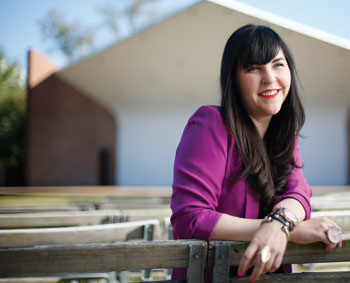“I want you to go places when you read Romeo and Juliet and not think that it’s a 400-year-old—or older than that now—dead text. I don’t want readers to think that it’s something inaccessible.”
— Amanda Havard
An acclaimed young adult novelist is now applying her vision, talent and Peabody connections to engage young readers with Shakespeare.
Amanda Havard, BS’08, MEd’10, is the author of The Survivors series, a five-book project about modern-day exiles of the Salem witch trials. Unlike traditional novels, Havard’s storytelling also uses multimedia components online and in an interactive application (app) of the book. Dubbed an Immersedition by Havard and her publishing team, the trademark-pending franchise includes interwoven links to biographies of historical persons, character profiles, photos, a soundtrack, background on history and mythology, YouTube videos, sound effects and even characters’ Twitter accounts.
Now Havard has reached out to Peabody for assistance for her next project, an Immersedition version of Romeo and Juliet for the iPad.
“I’ve taken this very clear step back to my educational roots and am building educational Immerseditions for my publisher,” Havard says. “I want you to go places when you read Romeo and Juliet and not think that it’s a 400-year-old—or older than that now—dead text. I don’t want readers to think that it’s something inaccessible.”

Havard worked with Melanie Hundley, assistant professor of the practice in English language arts, on the educational project. The curriculum writer was Stephanie Sefcik, BS’08, MEd’10. Diana Whitmore, a Peabody intern, project managed the Romeo and Juliet app build. In addition, Havard says that Whitmore, an HOD major, frequently reached out to her own Peabody professors for input and advice.
Havard knows that the project faces challenges, but believes that the Romeo and Juliet Immersedition will reach students who are difficult to engage through traditional teaching methods.
“On Melanie Hundley’s suggestion, we went to the National Council of Teachers of English conference this fall to get this in front of teachers. I know we can’t just walk into school districts and say, ‘You should adopt this,’ and expect them to,” Havard says. “But if you are a teacher who has iPads in your classroom—whether because you’re in a private school or in a low-income, high-need public school and you’ve received them through grants—this serves a purpose for you and your students. And not because it tells them what to write on essays or because it says, ‘hey, do this,’ but because it really teaches them to pull apart Shakespeare, line by line, moment by moment.”
As an early childhood development major, Havard developed an interest in literacy, and particularly, in how important it is that children go places in their minds when they read stories.
“There are a number of things that I learned at Peabody that play into both the way I write books and now the way we’re starting to do apps,” says Havard, who earned her master’s in curriculum and instructional leadership. “I remember the phrase ‘You want kids to go places when they read stories.’ That’s exactly what Immerseditions are designed to do.”